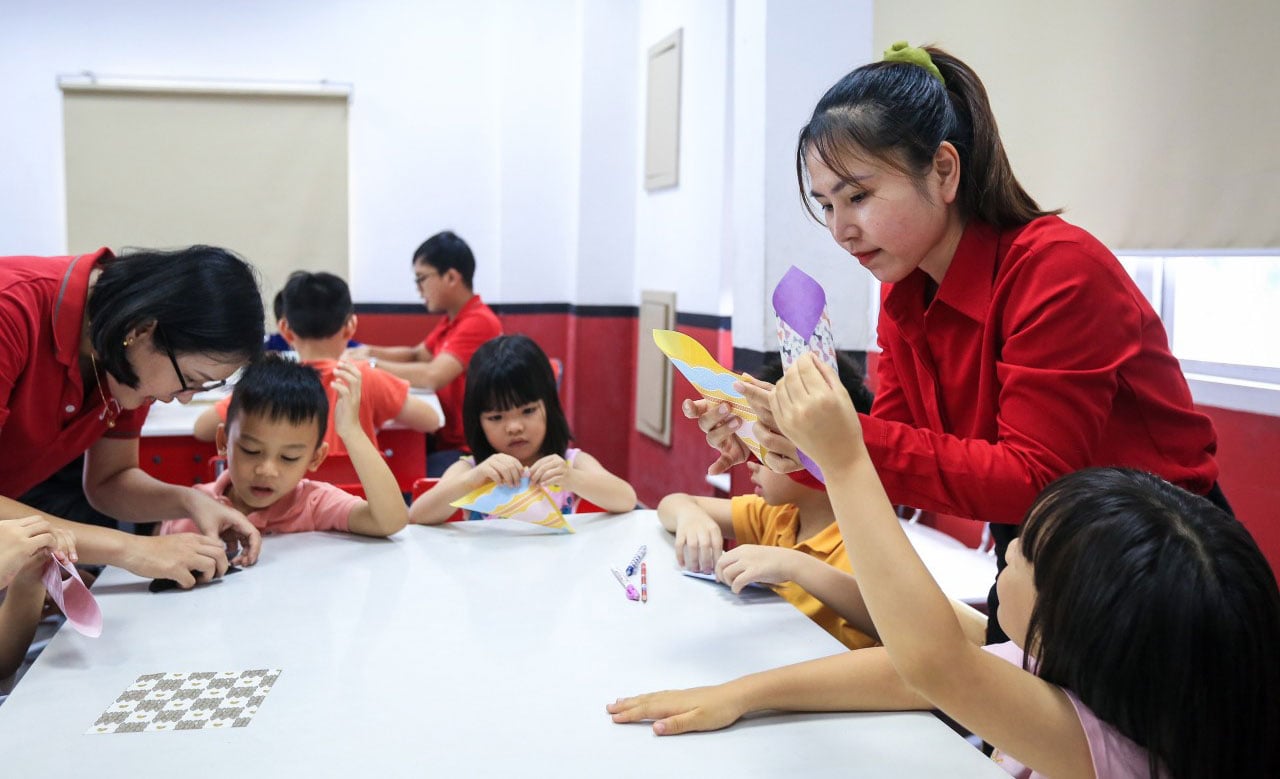Demand increases, supply increases.
Simply typing the keyword "thinking math" on Google will bring up a series of reputable centers in Ho Chi Minh City, suggesting that parents should enroll their children in trial classes to experience thinking math with various models from different countries such as Singaporean thinking math, Japanese thinking math, and American thinking math… There are online programs, in-person programs, some teaching thinking math entirely in Vietnamese, and others offering programs taught in both English and Vietnamese.

Children learn critical thinking math at a center in District 3, Ho Chi Minh City, on the morning of June 3rd.
The curricula are translated from foreign sources, supplemented and arranged to suit Vietnamese students, including age-appropriate knowledge topics (closely aligned with the Ministry of Education and Training's mathematics textbooks). In addition, they include many characteristic thinking topics such as group thinking, proportional thinking, patterns, etc.; a system of exercises designed by topic (from providing foundational knowledge to advanced training) and guidance on applying thinking skills…
On Ta Quang Buu Street, Ward 5, District 8, Ho Chi Minh City, one weekday evening, in front of a math tutoring center called KM, a large number of parents parked their vehicles waiting to pick up their children after school. Located in the Phu My Hung urban area, District 7, a math tutoring center on Nguyen Van Linh Street was also bustling with students and parents coming and going on a Saturday morning.
Having offered in-person (offline) classes since 2011, the VS mental math center, with offices in District 7 and Thu Duc City, Ho Chi Minh City, switched to online teaching in 2019. They claim to have over 15,000 students, ranging from kindergarten age 3-4. Meanwhile, the A. mental math center, which offers in-person classes and has 25 centers across Vietnam, claims to have 12,000 students…
Why are parents so enthusiastic about critical thinking math?
Ms. Trinh Thi Nghia Thao, a mathematics teacher at the Asian International School, said: "Currently, according to the 2018 General Education Program, the Ministry of Education and Training has set the goal of teaching and learning mathematics to improve mathematical competencies such as: mathematical thinking and reasoning skills, mathematical problem-solving skills… In addition, current mathematics textbooks have also added many practical and interdisciplinary contents, with the aim of helping students achieve these mathematical competencies."
"However, the teaching time is quite limited, and each child has different characteristics, so teaching them to think critically is something every teacher wants but is very difficult to achieve. Math centers that focus on critical thinking have more time and less pressure regarding grades, so they can effectively teach and guide children to think critically," Ms. Thao explained about the recent popularity of math centers focusing on critical thinking, especially during the summer.
Tony Ngo, a Vietnamese-American who returned to Vietnam to start a business and co-founder of Everest Education (specializing in developing independent thinking, logic, and math skills for students) in Ho Chi Minh City, said that children as young as 3-4 years old can already learn critical thinking math. In the US, many children as young as 2 years old are already being taught critical thinking math by their families.
"In the future, speed of calculation will no longer be important; what matters is how to apply mathematics to real life so that it becomes truly useful. Mathematical thinking teaches logic and problem-solving skills, guiding children from understanding – deciding on a method – doing – and checking. Therefore, it is receiving increasing attention from parents," said Tony Ngo.
Ms. Ngo Thu Hien, academic manager of VISPARK's mental math center, said that when parents look for any learning program for their children, they need to understand their goals. Many want to enroll their children in mental math programs so they can get high math scores at school. Many enroll their children out of curiosity. However, parents need to clearly understand their purpose, and then when looking for centers, they need to know what curriculum the center uses. Clearly, learning mental math isn't about immediately getting high math scores in class. Scores are only a short-term result, not a sustainable long-term path in mental math.

Many parents tend to enroll their children in critical thinking math classes with the hope that their children will excel in math.
Mistakes made by parents
Mr. Pham Chau Lich, Director of Professional Services at Mathnasium Vietnam, points out many fundamental misconceptions parents have when enrolling their children in mental math programs. Some parents believe that mental math is a completely different type of math from the math curriculum that students learn in school using textbooks from the Ministry of Education and Training.
Some parents often have high expectations and compare their child's progress (cognitive development) with other students without realizing that cognitive development varies from child to child. Parents should only consider and compare the changes in each child at each stage of their learning to see how much progress they have made.
"To develop critical thinking skills, students need to cultivate thinking habits. Most students lack these habits and only possess calculation skills. Forming or changing these habits takes time and depends on each student's individual ability. The more accustomed students are to rote, mechanical learning, the more time it takes to change," Mr. Lich said.
What is mathematical thinking?
Ms. Trinh Thi Nghia Thao stated that mathematical thinking is a subject that uses numbers, images, visual aids, etc., to help children achieve mathematical abilities as well as logical thinking, analysis, reasoning, synthesis, and problem-solving skills.
Ms. Thao said that some parents misunderstand the difference between difficult math problems and problems that require critical thinking. "Critical thinking" here means wanting children to be able to think, reason, and analyze independently to confidently come up with solutions to difficult problems.
Mathematical thinking isn't about repeating math problems; it's about developing critical thinking skills and self-learning abilities. Children might encounter problems they've never been taught, or real-life issues they've never faced before, and each child will find their own solution.
"That solution might be right, it might be wrong, but that's the kind of thinking – observing, synthesizing, and ultimately solving the problem," Ms. Thao said.
Source link



![[Photo] A large number of people offer incense and visit the Ho Chi Minh Memorial Church.](https://vphoto.vietnam.vn/thumb/1200x675/vietnam/resource/IMAGE/2026/02/21/1771668099014_ndo_br_12-resize-7721-jpg.webp)









































































































Comment (0)